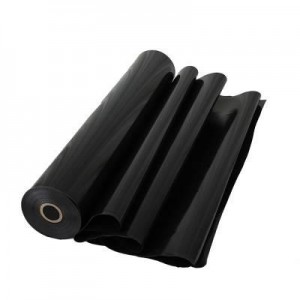Polyvinyl Chloride (PVC) Geomembrane
Short Description:
Polyvinyl Chloride (PVC) geomembrane is a kind of geosynthetic material made from polyvinyl chloride resin as the main raw material, with the addition of appropriate amounts of plasticizers, stabilizers, antioxidants and other additives through processes such as calendering and extrusion.
Polyvinyl Chloride (PVC) geomembrane is a kind of geosynthetic material made from polyvinyl chloride resin as the main raw material, with the addition of appropriate amounts of plasticizers, stabilizers, antioxidants and other additives through processes such as calendering and extrusion.

Performance characteristics
Good physical properties: PVC geomembrane has high tensile strength and tear strength, which can withstand certain external forces of pulling and tearing and is not easy to be damaged. At the same time, it has good flexibility and can adapt to different construction conditions and foundation deformations.
Excellent chemical stability: It has good resistance to corrosion by chemical substances such as acids, alkalis and salts. It can maintain stable performance in different chemical environments and is not easily eroded by chemical substances, which is suitable for various engineering environments with the risk of chemical corrosion.
Excellent waterproof performance: PVC geomembrane has extremely low water permeability, which can effectively prevent the penetration of water and play a good role in waterproofing and anti - seepage, and can be widely used in the engineering fields that require waterproofing.
Good anti - microbial properties: It has certain resistance to microbial erosion, is not easily decomposed or damaged by microorganisms, and can maintain stable performance in long - term use.
Convenient construction: PVC geomembrane is light in weight, easy to handle and lay, and can be cut and spliced according to the needs of the project, with high construction efficiency. At the same time, its bonding performance with the base is good, and it can be firmly attached to the surface of the base to ensure the anti - seepage effect.
Application fields
Water conservancy projects: Such as the anti - seepage projects of reservoirs, dams and canals, which can effectively prevent water leakage, reduce the loss of water resources and improve the safety and stability of water conservancy facilities.
Sewage treatment projects: It is used for the anti - seepage of sewage treatment tanks and oxidation ponds to prevent the leakage of sewage from polluting the surrounding soil and groundwater, and can resist the corrosion of chemical substances in the sewage.
Landfill projects: As the anti - seepage liner of landfills, it can prevent the leakage of landfill leachate into the groundwater and protect the safety of the surrounding environment and groundwater.
Aquaculture projects: It is applied in aquaculture ponds such as fish ponds and shrimp ponds, which can effectively maintain the water level of the ponds, prevent water leakage, and provide a stable water environment for aquaculture.
Other fields: It can also be applied to the waterproof projects of some industrial buildings, the anti - seepage projects of salt pans, and the anti - seepage projects of artificial lakes and landscape lakes.













